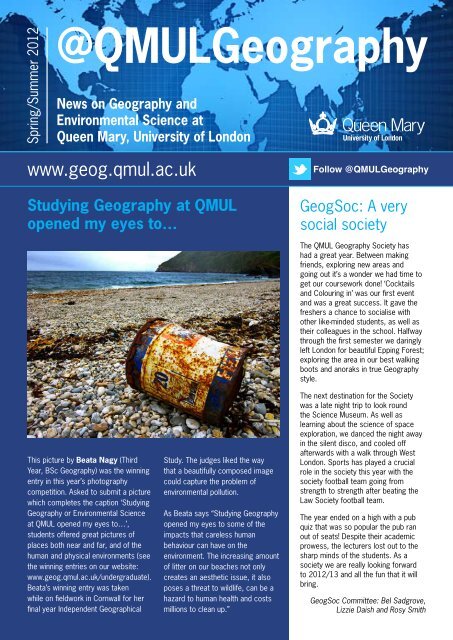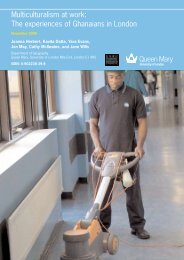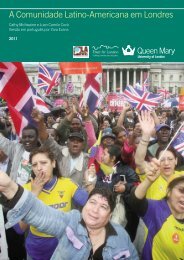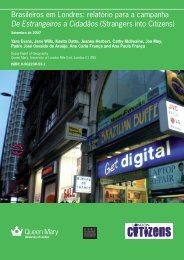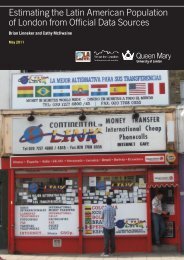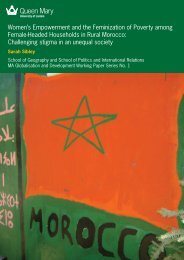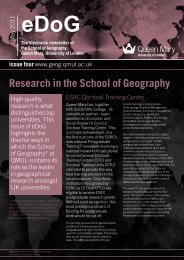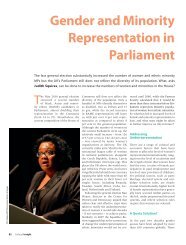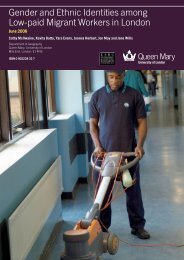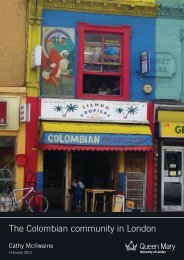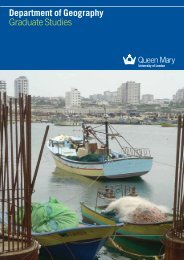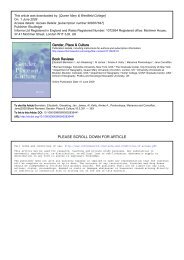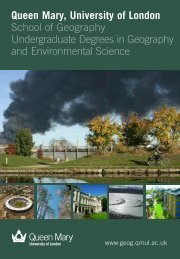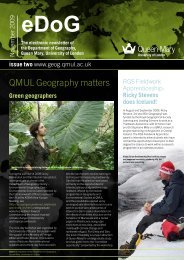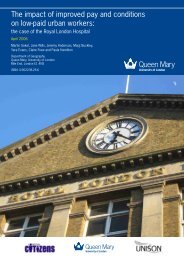Spring/Summer 2012 issue - School of Geography - Queen Mary ...
Spring/Summer 2012 issue - School of Geography - Queen Mary ...
Spring/Summer 2012 issue - School of Geography - Queen Mary ...
You also want an ePaper? Increase the reach of your titles
YUMPU automatically turns print PDFs into web optimized ePapers that Google loves.
<strong>Spring</strong>/<strong>Summer</strong> <strong>2012</strong>@QMUL<strong>Geography</strong>News on <strong>Geography</strong> andEnvironmental Science at<strong>Queen</strong> <strong>Mary</strong>, University <strong>of</strong> Londonwww.geog.qmul.ac.ukStudying <strong>Geography</strong> at QMULopened my eyes to…Follow @QMUL<strong>Geography</strong>GeogSoc: A verysocial societyThis picture by Beata Nagy (ThirdYear, BSc <strong>Geography</strong>) was the winningentry in this year’s photographycompetition. Asked to submit a picturewhich completes the caption ‘Studying<strong>Geography</strong> or Environmental Scienceat QMUL opened my eyes to…’,students <strong>of</strong>fered great pictures <strong>of</strong>places both near and far, and <strong>of</strong> thehuman and physical environments (seethe winning entries on our website:www.geog.qmul.ac.uk/undergraduate).Beata’s winning entry was takenwhile on fieldwork in Cornwall for herfinal year Independent GeographicalStudy. The judges liked the waythat a beautifully composed imagecould capture the problem <strong>of</strong>environmental pollution.As Beata says “Studying <strong>Geography</strong>opened my eyes to some <strong>of</strong> theimpacts that careless humanbehaviour can have on theenvironment. The increasing amount<strong>of</strong> litter on our beaches not onlycreates an aesthetic <strong>issue</strong>, it alsoposes a threat to wildlife, can be ahazard to human health and costsmillions to clean up.”The QMUL <strong>Geography</strong> Society hashad a great year. Between makingfriends, exploring new areas andgoing out it’s a wonder we had time toget our coursework done! ‘Cocktailsand Colouring in’ was our first eventand was a great success. It gave thefreshers a chance to socialise withother like-minded students, as well astheir colleagues in the school. Halfwaythrough the first semester we daringlyleft London for beautiful Epping Forest;exploring the area in our best walkingboots and anoraks in true <strong>Geography</strong>style.The next destination for the Societywas a late night trip to look roundthe Science Museum. As well aslearning about the science <strong>of</strong> spaceexploration, we danced the night awayin the silent disco, and cooled <strong>of</strong>fafterwards with a walk through WestLondon. Sports has played a crucialrole in the society this year with thesociety football team going fromstrength to strength after beating theLaw Society football team.The year ended on a high with a pubquiz that was so popular the pub ranout <strong>of</strong> seats! Despite their academicprowess, the lecturers lost out to thesharp minds <strong>of</strong> the students. As asociety we are really looking forwardto <strong>2012</strong>/13 and all the fun that it willbring.GeogSoc Committee: Bel Sadgrove,Lizzie Daish and Rosy Smith
Will the Olympics improve London’s Health?East London playshost to the OlympicGames this summer,and researchersfrom the <strong>School</strong> <strong>of</strong><strong>Geography</strong> led byPr<strong>of</strong>essor Steve Cummins areinvestigating what the Games’legacy will be for the city.As Pr<strong>of</strong>essor Cummins says, over thepast decade health and life chancesin urban environments have seenincreasingly large differences growingbetween the richest and poorestpeople and between the richest andpoorest areas. With over half <strong>of</strong> the<strong>of</strong> the world’s population now livingin cities, understanding how urbanenvironments shape the health <strong>of</strong>populations is a top priority for nationaland local governments, researchersand non-pr<strong>of</strong>it organisations. Tacklingthe risks to health where we live, workand play may play a key role in helpingameliorate the widening health ‘gap’between people and places.So an interdisciplinary group <strong>of</strong> QMULresearchers from across the social,medical and life sciences, led by the<strong>School</strong> <strong>of</strong> <strong>Geography</strong>, have cometo together to think creatively abouthow changing the social and physicalenvironments <strong>of</strong> cities might contributeto improving health. The new Centrefor Urban Health at QMUL will conductbasic science in order to betterunderstand the urban environmentalrisks to health, and crucially, undertakeevaluations <strong>of</strong> interventions that aim toimprove the health and life chances <strong>of</strong>urban communities.A current flagship project for theCentre is the £2 million ORiEL Study,which seeks to evaluate the healthand social legacy <strong>of</strong> the <strong>2012</strong> LondonOlympics. This project will follow thelives <strong>of</strong> approximately 3000 familiesover the next five years to investigateif the <strong>2012</strong> games, and its legacy <strong>of</strong>change in East London, will have alasting impact on their lives.<strong>Geography</strong> and Community: The Big Society?Pr<strong>of</strong>essor Jane Wills<strong>of</strong> the <strong>School</strong> <strong>of</strong><strong>Geography</strong> is beingfunded by the LeverhulmeTrust to studythe government’sdrive to encourage local communityinvolvement in politics, part <strong>of</strong> what iscalled “the Big Society”.Her project Place and Politics:Localism in the United Kingdom willexplore how far the new Localism Actprovides scope for local authoritiesand local communities to develop agreater role in planning, local servicesand community-based assets (likelibraries, community centres andparks). The project will chart theoutcomes <strong>of</strong> top-down and bottom-uplocalism and determine whether it isproducing democratic renewal in theUK. Jane plans to conduct interviewswith national policy makers, andidentify case study locations wherepeople are mobilising around localismto try and effect change in their03areas. She hopes this will allow her tocontribute to policy debate about thedemocratic deficit, the Big Society andthe role <strong>of</strong> localism in the UK.The project reflects Jane’s widerinterests in community organising.She has got second year studentsin the <strong>School</strong> <strong>of</strong> <strong>Geography</strong> involvedin running research projects forcommunity organisations and sheconvenes the first ever Mastersprogramme in Community Organising.Students study communityorganising in small-groupseminars, but they alsocomplete a practicalassignment working asa volunteer communityorganiser for 5 months withCitizens UK, the network <strong>of</strong>community alliances thatincludes London Citizens,Citizens:MK and NottinghamCitizens. The studentsalso work with expertsin film studies to make ashort film about their experiences(see our website). Experiences haveincluded working with the Chinese andCongolese communities in London;focusing on black-majority churchesin London; the launch <strong>of</strong> new alliancesin North London and Shoreditch;campaigning for a green-man crossingin West London; mapping civilsociety in Goodmayes; and makinglinks between health services andcommunity organising in South London.www.geog.qmul.ac.uk
Field trips: Florida and IrelandStudents on the BSc <strong>Geography</strong>and BSc Environmental Scienceprogrammes can elect to takethe module ‘Coastal and AquaticManagement’ in their third year.An important component <strong>of</strong> thismodule is a 10 day field trip tosouth Florida, USA.“Our field trip to Florida took us fromMiami, through the Everglades, upto the Kissimmee River and LakeOkeechobee and finally to TampaBay. We studied a range <strong>of</strong> projectsand programmes focussing on therestoration and management <strong>of</strong> aquaticand coastal environments, includingsub-tropical wetlands, mangroveforests and estuaries. We metscientists at the Everglades NationalPark, Loxahatchee Wildlife Refugeand Tampa Bay Estuary Program,providing us with a great insight intothe complexity <strong>of</strong> water managementand the <strong>issue</strong>s faced by the restoration<strong>of</strong> natural habitats. We even spoke toa farmer who was managing his dairyfarm in a water and pollution consciousway. This came as a bit <strong>of</strong> a shock tomany in the group as he was just asworried about his impact on the localriver as the productivity <strong>of</strong> his dairyfarm. In addition to these talks, wespent an afternoon canoeing througha restored mangrove environment,which was not just informative butgreat fun. This module tied in with alot <strong>of</strong> others and greatly widened ourscope and understanding <strong>of</strong> manymanagement <strong>issue</strong>s. Overall thishas without a doubt been the mostenjoyable and interesting field tripmost <strong>of</strong> us have ever been on and wewould recommend it to anyone takinga <strong>Geography</strong> or Environmental Sciencecourse at QMUL.”Rhiannon Jones and Will O’MahoneyThe beach and dune systems at Fort Desoto, South FloridaStudents on the BA <strong>Geography</strong>and BA Human <strong>Geography</strong>programmes can elect to takethe module ‘<strong>Geography</strong>, Identityand Belonging’ in their second orthird year. The module includes aweek-long trip to Ireland.“Our fieldcourse took us to Dublinand Belfast on a highly memorableand enjoyable trip. In Dublin wefocused on <strong>issue</strong>s <strong>of</strong> heritage; ourinvestigations took us round the citysights, to the infamous KilmainhamGaol, Collins Barracks, and TrinityCollege Dublin. However, we were alsoable to experience a side <strong>of</strong> the cityrarely seen by tourists; the Monto,and hear a personal account <strong>of</strong> thearea’s legacy. Whilst we were stayingin the city we also performed groupinterviews to explore particular aspects<strong>of</strong> Irish identity which, for many <strong>of</strong> us,was our first experience <strong>of</strong> real-worldresearch. We also got a taste <strong>of</strong> theIrish countryside as we travelled northto Belfast and all marvelled at theseeming absence <strong>of</strong> a border betweenthe two countries! Then we jumpedright back in with a city coach tourthat took us to prominent locations <strong>of</strong>the Northern Ireland conflict. As wellas receiving lectures from <strong>Queen</strong>’sUniversity Belfast we gained aninvaluable education from social andcommunity groups dealing with theongoing conflict. Our final stop wasperhaps the most anticipated: the StPatrick’s Day parade in Belfast. Notonly were we able to observe thecelebrations but we also took part inthe festivities; all in all it was a greatcraic!”Emily Nash04News on <strong>Geography</strong> and Environmental Scienceat <strong>Queen</strong> <strong>Mary</strong>, University <strong>of</strong> London


